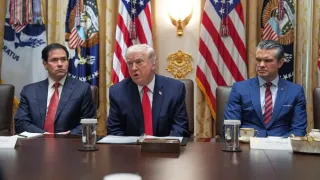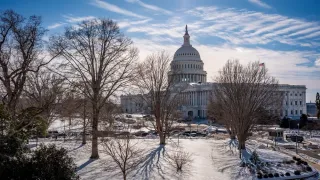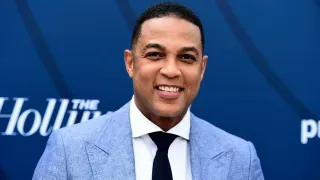February 11, 2017
SFPD Leaves FBI Terror Task Force Over Trump Crackdown
Seth Hemmelgarn READ TIME: 5 MIN.
Amid concerns about President Donald Trump's efforts to crack down on illegal immigration and restrict Muslims from entering the country, the San Francisco Police Department has suspended its participation in the FBI's Joint Terrorism Task Force.
Community and legal groups in the city have been concerned that local police working with the JTTF may be violating the sanctuary city policy and other local laws meant to protect immigrants and others from unlawful investigations.
The police department announced the decision by newly sworn-in Chief Bill Scott February 1, just before a report on the department's work with the FBI in 2016 was to be presented to the Police Commission.
In a news release, the SFPD said the JTTF Memoranda of Understanding, which was signed in 2007, was coming up for review by the Board of Supervisors, as required by city rules, which also call for any new MOU for the task force to come before a public Police Commission meeting for approval.
"The department plans on updating General Order, 8.10, Guideline for First Amendment Activities, in the near future and will seek clarification from the Police Commission as to the application of General Order 8.10 to JTTF investigations," the police news release said. General Order 8.10 sets forth requirements for when an SFPD officer conducts a criminal investigation that involves the First Amendment activities of a person, group, or organization.
"The department is committed to community policing and will work collaboratively with the stakeholders when work on the General Order begins," the police said, adding, "once the new General Order is adopted, the department may consider renegotiating the JTTF MOU with the FBI, only after seeking guidance from the Police Commission.
"The SFPD is committed to public safety and will continue to work diligently to keep San Francisco safe for everyone," the release said.
A statement from the FBI said that the agency's San Francisco office "is aware of the pending expiration of the memorandum between the San Francisco Police Department and the Joint Terrorism Task Force and the subsequent suspension of SFPD's involvement in the JTTF. The expiration of this MOU was built into this document a decade ago to facilitate adjustments based on the evolution of threats to San Francisco and the Bay Area."
In its statement, the agency continued, "The FBI considers the suspension of SFPD involvement in the JTTF as temporary and looks forward to developing a new MOU with the SFPD to more accurately reflect current policies and procedures within each agency."
At the time of the suspension, there were just two police officers assigned to the JTTF, which routinely conducts investigations of people without probable cause.
For more than a year the Asian Law Caucus, the American Civil Liberties Union of Northern California, and the Council on American-Islamic Relations San Francisco Bay Area Office have been raising concerns that the 2012 Safe San Francisco Civil Rights Ordinance is not being fully implemented. The city policy sets out a number of restrictions that the police working with the FBI are supposed to follow.
In a letter sent to police department brass in early January, the three groups stressed that due to the new administration in Washington, D.C. it was even more imperative for the issues they have raised to be addressed.
"While we are continuing collaborative efforts aimed at fixing the serious problems that have now been identified and conceded by all involved, the election of Donald Trump and his imminent inauguration renders these issues extremely urgent. Through this letter, we hope to not only thoroughly update you on the status of these issues, but also provide you with a preview of the necessary steps that must occur in the next few weeks," read the January 5 letter, signed by the law caucus' Christina Sinha, the ACLU's Alan Schlosser, and CAIR's Brittney Rezaei.
In a phone interview before police announced the suspension, Sinha told the Bay Area Reporter that she and others were merely asking that the police officers assigned to work with the FBI be given the proper training to understand what they can and cannot do under both California and San Francisco laws.
"If their officers don't know what the rules are, how can we expect them to follow it?" she asked. "We want SFPD to train their officers properly."
After Scott's decision was announced, Sinha said, "Everyone in my organization is thrilled the SFPD has decided to do the right thing and step out of JTTF."
However, she said groups such as hers would remain "vigilant." She noted that the suspension "does not mean they cannot ever reenter that agreement."
In response to the B.A.R.'s emailed questions, Sergeant Michael Andraychak, a police spokesman, said what would need to change in order for police to again participate in the JTTF "is a discussion for the Police Commission to hold with input from the community and stakeholders."
LGBTs' Message
Before the suspension was announced, LGBT leaders in San Francisco also wrote to local law enforcement officials, as well as the mayor and supervisors, to lend their support to the calls for better training of the police officers assigned to the JTTF. They also called upon the Police Commission to fully implement the ordinance passed five years ago.
"The Safe San Francisco Civil Rights Ordinance forbids any SFPD officers working with the FBI on the Joint Terrorism Task Force from participating in any work that targets people - without reasonable suspicion of criminal behavior - based solely or partially on their religion or national origin. Our sanctuary city law prohibits SFPD officers from participating in efforts to identify undocumented people in our city," the leaders wrote in their letter.
They added that "if this ordinance is not effectively enforced, and if SFPD officers are not fully trained to understand and follow its requirements, those local officers will become entangled in the implementation of Trump's policies, which our city's leadership and residents have unequivocally rejected."
Among the signatories were gay former city supervisor David Campos and Assemblyman Tom Ammiano; National Center for Lesbian Rights Executive Director Kate Kendell; Pride Law Fund Co-Chairs Kate Walsham and Steve Tang; and former police commissioner Gwenn Craig.
A letter prepared by Joyce M. Hicks, executive director of the Office of Citizen Complaints (now known as the Department of Police Accountability), for last week's hearing states that the department determined that, due to "inadequate training," an officer last year violated Department General Order 8.10.
The letter included four recommendations from the Department of Police Accountability, including that SFPD "immediately update" its training on how officers are to conduct investigations involving a person's First Amendment rights and issue a department-wide bulletin about the requirements under Department General Order 8.10.
It also recommended "a police commissioner be designated to assist the DPA, SFPD and the stakeholders address issues raised by SFPD investigations involving First Amendment activities."






